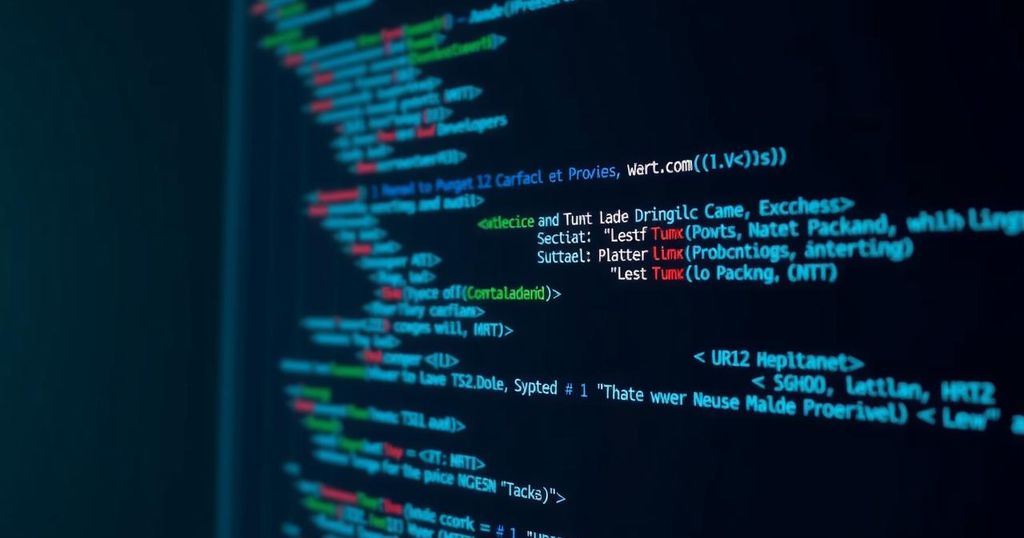Vitalik Buterin Proposes AI-Powered Code Audits for Enhanced Ethereum Security
With $2 billion lost to hacks in 2023, Ethereum co-founder Vitalik Buterin proposes utilizing AI for code audits to improve security. AI’s ability to learn and adapt could significantly enhance the effectiveness of detecting vulnerabilities, potentially reshaping blockchain technology’s security landscape.
In a landscape marred by vulnerabilities, Ethereum co-founder Vitalik Buterin is championing the innovative embrace of artificial intelligence (AI) in the realm of code audits. Amid staggering losses, totaling an estimated $2 billion in 2023 due to hacks and scams, his vision stands as a beacon of hope. By leveraging AI to enhance code verification, Buterin aims to significantly mitigate risks posed by software bugs.
The application of AI in this context is particularly exciting, as these systems can continually learn from evolving data, making them far more effective than traditional automated auditing tools, which are often limited in their scope. Developers are already envisioning a partnership between human intuition and AI’s relentless analytical prowess, crafting a compelling narrative of technological evolution.
As crypto’s tumultuous narrative unfolds, Ethereum—anchored by its complexity and high-profile projects—has borne the brunt of many exploitations. In Buterin’s view, the integration of AI into smart contract audits could reshape the fabric of security within blockchain technology. He expressed his enthusiasm in a tweet, stating, “One application of AI that I am excited about is AI-assisted formal verification of code and bug finding.”
Currently, blockchain projects utilize various automated tools for smart contract audits, but these programs lack the adaptability to respond to new threats. By contrast, AI tools can be intricately trained to detect and adapt to emerging vulnerabilities, marking a significant evolution in the security domain. As noted by a TokenFi developer, “AI can be trained to recognize and adapt to new information and context, making it more effective at identifying vulnerabilities that may not be covered by static analysis rules.”
Buterin’s vision entails a synergistic approach whereby AI and human oversight coexist, enhancing the detection capabilities for potential vulnerabilities. RJ Ke, a developer at Ethereum’s layer-2 Taiko, emphasized the transformative potential of AI, stating that it could
“assist with highly technical tasks such as ensuring that the code behaves as expected under various conditions.” This innovative melding of human and machine could empower developers to gain new insights and advance the Ethereum ecosystem, amidst a backdrop of significant financial losses previously experienced in the crypto world.
In the backdrop of Buterin’s proposal, the Ethereum ecosystem has painfully witnessed losses that echo through the corridors of digital finance, with approximately $1.35 billion lost to exploitations, a staggering figure that speaks to the urgent need for enhanced security measures. The largest of these, a $230 million breach of Multichain, highlights the risks inherent in navigating this landscape.
Through the fusion of AI-driven audits and human diligence, Ethereum developers aim to sculpt a resilient fortress against the lurking threats that have besieged the industry. As Buterin’s ideas gain traction, the cryptocurrency realm stands on the precipice of a technological renaissance—a hopeful turn in the quest for robust security amidst the chaos.
The Ethereum network has become a pivotal player in the cryptocurrency world, praised for its extensive ecosystem but criticized for being vulnerable to hacks and scams. With an estimated loss of $2 billion in 2023 alone, it became essential to seek innovative solutions that could secure this blockchain against exploits. Vitalik Buterin’s advocacy for AI-assisted code audits emerges from the pressing need to adapt to new vulnerabilities and efficiently tackle software bugs, bridging human expertise with machine learning capacities. The call for enhanced security within the blockchain space resonates profoundly as the tech landscape not only evolves but also faces persistent threats that challenge its foundation.
In summary, Vitalik Buterin’s idea to implement AI in code audits signifies a pivotal shift towards enhancing security within the Ethereum network. Coupled with human oversight, AI’s adaptability and analytical strength present a promising solution in combating vulnerabilities that have plagued the crypto space. As the industry grapples with substantial losses, this innovative approach could very well chart a new course for the future of blockchain security and inspire resilience against malicious threats that continue to emerge.
Original Source: www.coindesk.com




Post Comment